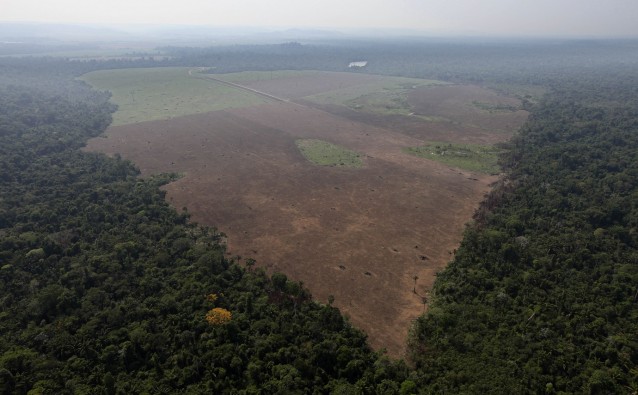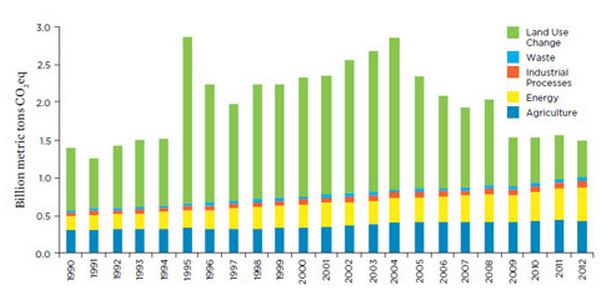Brazil Has Done More To Stop Climate Change Than Any Other Country, Study Finds
ENVIRONMENT, 30 Jun 2014

The Brazilian Amazon is arguably the world’s biggest natural defense against global warming, acting as a “sink,” or absorber, of carbon dioxide. CREDIT: AP Photo/Andre Penner
Thanks to its effort to reduce tropical deforestation, Brazil has kept 3.2 billion tons of carbon dioxide out of the atmosphere since 2004. That’s more than any other country has done to reduce climate change, according to a new study published Thursday [5 Jun 2014].
“Brazil is known as a leading favorite to win the World Cup, but they also lead the world in mitigating climate change,” the study’s lead author, Earth Innovation Institute director Daniel Nepstad, said in a statement.”
Though climate change is usually traced to the burning of fossil fuels, deforestation in Brazil has also played a huge role in causing it. Brazil’s Amazon rainforest — which once had the highest deforestation rate in the world as of 2005 — absorbs a huge amount of carbon dioxide, effectively preventing the gas from being emitted into the atmosphere.
When so much of that forest was burned and plowed over, though, a huge amount of carbon was emitted into the atmosphere instead of absorbed, making Brazil one of the world’s biggest greenhouse gas emitters. “Land use” emissions dwarfed those from energy or agriculture.
But now, Brazil seems to be taking steps to reduce their impact. The study, published in the journal Science, showed that Brazil was able to save more than 33,000 square miles of Amazon rainforest since 2004 while still being able increase beef and soy production. Saving those forests amounted to a 70 percent decline in deforestation, putting an enormous brake on greenhouse gas emissions. According to National Geographic, the cuts are more than three times bigger than the effect of taking all the cars in the U.S. off the road for a year.

In Brazil, emissions due to deforestation (green) have taken such a sharp downturn since 2004 that overall emissions have decreased in spite of continued increases from other causes. CREDIT: Union of Concerned Scientists
A number of policies and campaigns are credited with motivating Brazil to reduce its deforestation, including campaigns by Greenpeace and others to put pressure on companies that buy products that come from Amazon deforestation. Brazil’s forest code was also updated in 2012, requiring landowners to preserve 80 percent of the Amazon’s virgin forest.
“In Brazil, there was rising awareness of the value of nature and how essential it is to our society,” Fabio Rubio Scarano, vice president of Conservation International’s Americas Division, told National Geographic.
Brazil’s contribution to reducing deforestation has also helped fight land-use change-related emissions throughout the world, according to a separate study by the Union of Concerned Scientists, also released Thursday. While the 2007 report from the United Nations’ Intergovernmental Panel on Climate Change showed that roughly 17 percent of all greenhouse gas emissions come from deforestation, the UCS says that number has now decreased to 10 percent — thanks to efforts by Brazil and several other tropical countries.
“What’s surprising about today’s report is the number of countries that are effectively protecting their tropical forests and the wide variety of policies and programs that are working,” the UCS report’s author Doug Boucher said in a statement. “There’s no one right way to stop deforestation, but rather a smorgasbord of options.”
Go to Original – thinkprogress.org
DISCLAIMER: The statements, views and opinions expressed in pieces republished here are solely those of the authors and do not necessarily represent those of TMS. In accordance with title 17 U.S.C. section 107, this material is distributed without profit to those who have expressed a prior interest in receiving the included information for research and educational purposes. TMS has no affiliation whatsoever with the originator of this article nor is TMS endorsed or sponsored by the originator. “GO TO ORIGINAL” links are provided as a convenience to our readers and allow for verification of authenticity. However, as originating pages are often updated by their originating host sites, the versions posted may not match the versions our readers view when clicking the “GO TO ORIGINAL” links. This site contains copyrighted material the use of which has not always been specifically authorized by the copyright owner. We are making such material available in our efforts to advance understanding of environmental, political, human rights, economic, democracy, scientific, and social justice issues, etc. We believe this constitutes a ‘fair use’ of any such copyrighted material as provided for in section 107 of the US Copyright Law. In accordance with Title 17 U.S.C. Section 107, the material on this site is distributed without profit to those who have expressed a prior interest in receiving the included information for research and educational purposes. For more information go to: http://www.law.cornell.edu/uscode/17/107.shtml. If you wish to use copyrighted material from this site for purposes of your own that go beyond ‘fair use’, you must obtain permission from the copyright owner.